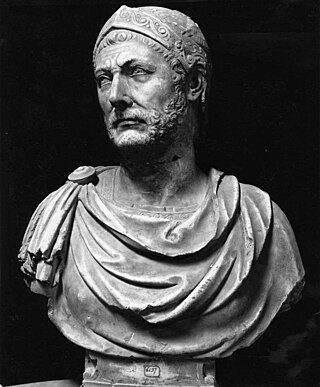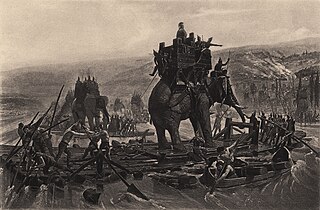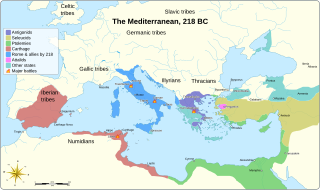Related Research Articles

Hannibal was a Carthaginian general and statesman who commanded the forces of Carthage in their battle against the Roman Republic during the Second Punic War.

The 3rd century BC started the first day of 300 BC and ended the last day of 201 BC. It is considered part of the Classical Era, epoch, or historical period.
This article concerns the period 229 BC – 220 BC.

This article concerns the 200 BC decade, that lasted from 209 BC to 200 BC.
This article concerns the period 269 BC – 260 BC.
This article concerns the period 239 BC – 230 BC.
This article concerns the period 219 BC – 210 BC.

Year 201 BC was a year of the pre-Julian Roman calendar. At the time it was known as the Year of the Consulship of Lentulus and Paetus. The denomination 201 BC for this year has been used since the early medieval period, when the Anno Domini calendar era became the prevalent method in Europe for naming years.
Year 205 BC was a year of the pre-Julian Roman calendar. At the time it was known as the Year of the Consulship of Scipio and Dives. The denomination 205 BC for this year has been used since the early medieval period, when the Anno Domini calendar era became the prevalent method in Europe for naming years.
Year 210 BC was a year of the pre-Julian Roman calendar. At the time it was known as the Year of the Consulship of Marcellus and Laevinus. The denomination 210 BC for this year has been used since the early medieval period, when the Anno Domini calendar era became the prevalent method in Europe for naming years.
Year 212 BC was a year of the pre-Julian Roman calendar. At the time it was known as the Year of the Consulship of Flaccus and Pulcher. The denomination 212 BC for this year has been used since the early medieval period, when the Anno Domini calendar era became the prevalent method in Europe for naming years.
Year 215 BC was a year of the pre-Julian Roman calendar. At the time it was known as the Year of the Consulship of Albinus/Marcellus/Verrucosus and Gracchus. The denomination 215 BC for this year has been used since the early medieval period, when the Anno Domini calendar era became the prevalent method in Europe for naming years.

Year 216 BC was a year of the pre-Julian Roman calendar. At the time it was known as the Year of the Consulship of Varro and Paullus. The denomination 216 BC for this year has been used since the early medieval period, when the Anno Domini calendar era became the prevalent method in Europe for naming years.

Marcus Claudius Marcellus, five times elected as consul of the Roman Republic, was an important Roman military leader during the Gallic War of 225 BC and the Second Punic War. Marcellus gained the most prestigious award a Roman general could earn, the spolia opima, for killing the Gallic military leader and king Viridomarus in single combat in 222 BC at the Battle of Clastidium. Furthermore, he is noted for having conquered the fortified city of Syracuse in a protracted siege during which Archimedes, the famous mathematician, scientist, and inventor, was killed, despite Marcellus ordering the soldiers under his command not to harm him. Marcus Claudius Marcellus died in battle in 208 BC, leaving behind a legacy of military conquests and a reinvigorated Roman legend of the spolia opima.

The First Macedonian War was fought by Rome, allied with the Aetolian League and Attalus I of Pergamon, against Philip V of Macedon, contemporaneously with the Second Punic War against Carthage. There were no decisive engagements, and the war ended in a stalemate.

The Third Battle of Nola was fought in 214 BC between Hannibal and a Roman army led by Marcus Claudius Marcellus. It was Hannibal's third attempt to take the town of Nola. Once again, Marcellus successfully prevented the town's capture.

The First Battle of Capua was fought in 212 BC between Hannibal and two Roman consular armies. The Roman force was led by two consuls, Quintus Fulvius Flaccus and Appius Claudius Pulcher. The Roman force was defeated, but managed to escape. Hannibal temporarily managed to raise the siege of Capua. A tactical Carthaginian victory, it ultimately did not help the Capuans.
Marcus Valerius Laevinus was a Roman consul and commander who rose to prominence during the Second Punic War and corresponding First Macedonian War. A member of the gens Valeria, an old patrician family believed to have migrated to Rome under the Sabine king T. Tatius, Laevinus played an integral role in the containment of the Macedonian threat.

The Battle of Canusium also known as the Battle of Asculum was a three-day engagement between the forces of Rome and Carthage. It took place in Apulia during the spring of 209 BC, the tenth year of the Second Punic War. A larger Roman offensive, of which it was a part, aimed to subjugate and to punish cities and tribes that had abandoned the alliance with Rome after the Battle of Cannae, and to narrow the base of the Carthaginian leader, Hannibal, in southern Italy.
References
- ↑ LeGlay, Marcel; Voisin, Jean-Louis; Le Bohec, Yann (2001). A History of Rome (Second ed.). Malden, Massachusetts: Blackwell. p. 77. ISBN 0-631-21858-0.
- ↑ Qian, Sima. Records of the Grand Historian, Section: The First Emperor, Section: Meng Tian.